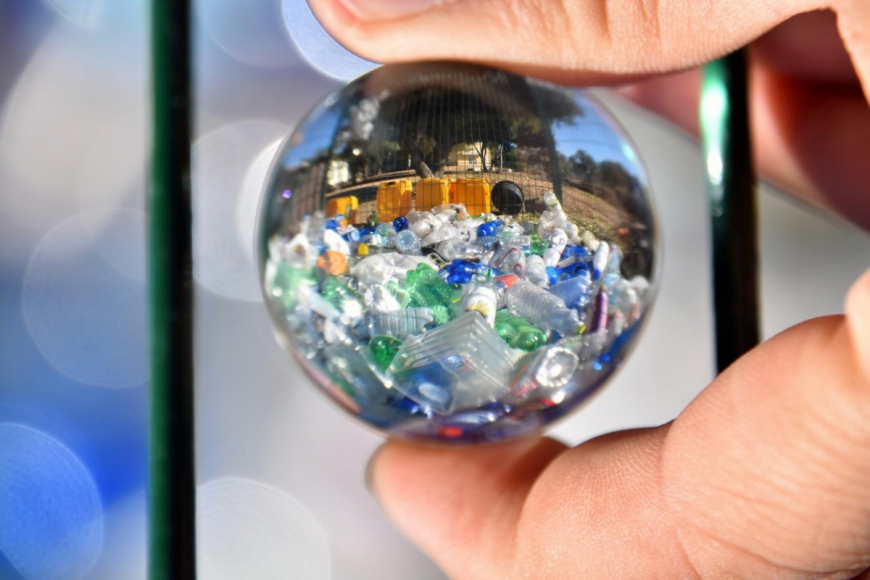While it may be fair to say our planet’s plastic situation has never been more dire, there has also never been a greater reason for optimism. Find out why.
We have bad news, and we have worse news. But don't despair because we also have some very good news.
The bad news is likely not news for most: We have a plastic waste problem. As we entered the year 2020, it had already become impossible to ignore.
The worse news is that the current global health crisis has exacerbated this problem significantly, as we will explain shortly.
The good news is that there are solutions, and they are already being implemented around the world. The next pivotal frontier lies in scaling and expanding these sustainable processes, and it is becoming a critical focus for the business community at large.
Plastic Pollution Pains
The numbers around plastic waste and its impact on the planet are staggering, and have been for some time. Consider these figures via National Geographic:
- 18 billion pounds of plastic waste flows into the oceans every year from coastal regions.
- Less than a fifth of all plastic is recycled globally.
- 40 percent of plastic produced is packaging, used just once and then discarded.
Estimates suggest that 73% of beach litter around the world is plastic, and that more than 5 trillion pieces of plastic are floating in our oceans. These are very sad statistics, with sobering long-term implications.
On top of all that, one consequence of the coronavirus pandemic we now face is an increase in plastic waste, as demand for single-use plastics spikes with people relying on the resource to keep food fresh, keep materials sterile, and support the healthcare system. Not only that, but many recycling facilities are scaling back or temporarily shutting down amid safety concerns. The United States has already had troubles dealing with its plastic waste since China drastically cut back on accepting imports of it in 2018.
What to do?
The fact is that this problem cannot be solved by one person, one company, or one nation. It requires concerted effort and attention from humanity as a collective. Just because a package is designed to be recyclable, doesn’t mean that it actually gets recycled, as that requires consumer engagement and local infrastructure. So it’s good to see data suggesting that people are becoming more interested in plastic waste.
It is likely that you or people you know have taken steps to reduce consumption -- cutting out plastic straws, taking reusable bags to the grocery store, opting for biodegradable packaging when possible -- and holding brands to account for their plastic packaging.
This presents an opportunity and cautionary note for companies with a role to play in mitigating this global challenge. Taking steps to do so is not only the right thing to do, but the smart business move: people want to buy from responsible companies, and plastic is becoming one of the most prominent corporate responsibility concerns. When discarded plastic emblazoned with your brand’s name washes up on shores around the world, the optics are obviously not good.
Now that we’ve firmly established the problem, let’s turn toward the solution.
How Advanced Recycling is Changing the Game
Technology is enabling new solutions to help us work toward a more circular model for plastic use. Emerging advanced recycling processes can break plastic down to its base and make it 100 percent reusable.
This approach, as Newsweek describes it, “alters the physical state of the plastic, returning the material to its constituent parts (or building blocks) and thus a more purified (or "virgin") form, by dissolving it in chemicals or breaking it down with heat. It can then be returned to the industry and made into brand-new, high-quality plastic objects.”
This avenue offers a more effective and feasible solution than simply using less plastic or repairing an inefficient commercial recycling system. That is not to say chemical recycling should replace those techniques, because they do have their place, but they aren’t doing enough on their own. As a complementary solution, chemical (or advanced) recycling has the ability to correct the current linear path of plastic waste.
Using less plastic is always a worthy aspiration, but it's not the only option. The key to progress lies in creating less plastic.
Advanced recycling is a step toward the circular model we need. So why isn’t it being adopted at a faster rate?
Overcoming Barriers to Reduce Industrial Plastic Waste
Numerous industries can take part in addressing plastic waste challenges. We’ve been pleased to see so many of our clients across Food & Bev, Petrochemical, Healthcare, and others take meaningful steps to reduce their footprints.
Those who wish to level up by taking advantage of new methods and technologies like chemical recycling face four key barriers:
- Access: Chemical recycling plants are not prevalent enough or scaled up to the level that they can handle our massive volume of plastic waste. Commercial and residential jurisdictions also create obstacles.
- System Efficiency: Logistics and transportation systems are not built out in a unified and efficient way, contributing to access issues and inhibiting participation.
- Regulatory Barriers: Without an overarching regulatory framework in place, laws and policies are scattered and suppressive. For example, a chemical recycling facility may not be able to colocate in an optimal spot to receive materials due to zoning restrictions. Further, fee systems and deposits fail to capture many packaging types, inhibiting growth in the rate of materials being collected for recycling.
- Market Enablement: Investments need to be made in infrastructure and technology to make these solutions affordable and viable for more organizations. Fortunately, momentum has begun to build here as American industries have sought alternatives in the wake of China cutting off imports.
None of these are insurmountable, and indeed, progress is happening on all fronts. To accelerate it, we all need to come together. By collaborating and forming coalitions, various industries will be able to make a powerful impact on the plastic pollution problem.
Let’s take a look at one example.
United Action in Practice
Facilitated and supported by Antea Group since 2011, the Healthcare Plastics Recycling Council (HPRC) exemplifies the cooperative approach required to seriously address this issue. Bringing together major corporations, healthcare providers, equipment manufacturers, and recyclers in a shared mission, HPRC is a united front. Its efforts are critical in this current moment.
Some of HPRC’s initiatives:
- Mapping the healthcare plastics value chain by defining and identifying issues and barriers that disable plastics recycling;
- Creating the HospiCycle toolkit, an A-Z guide to starting, expanding, and optimizing a hospital plastics recycling program;
- Developing Design for Recycling Guidelines that focus on articulating product and packaging design considerations that could enhance recycling potential and value; and
- Conducting pilot study programs within healthcare facilities focused on building a data model to facilitate economic analysis of plastics recycling.
As we move forward, it will be inspiring to see more innovative consortiums such as these form across the business landscape. While it may be fair to say our planet’s plastic situation has never been more dire, there has also never been a greater reason for optimism.
Technology is advancing. People are uniting. Concrete hope is on the horizon. But we need to stay at it.
We’re Here and Ready to Help
Antea Group is a business, and we care deeply about what we do. A desire to make the world a healthier, safer and cleaner place drives our organization and our people. Addressing plastic waste represents one of the biggest opportunities for transformative positive impact on the world we leave behind. And increasingly, there are bottom-line business incentives as well.
We are extremely eager to help companies that are ready and willing take the next step in tackling one of Earth’s most urgent troubles. Reach out to us if you’d like to discuss what you can do.
Want more news and insights like this?
Sign up for our monthly e-newsletter, The New Leaf. Our goal is to keep you updated, educated and even a bit entertained as it relates to all things EHS and sustainability.
Get e-NewsletterHave any questions?
Contact us to discuss your environment, health, safety and sustainability needs today.





